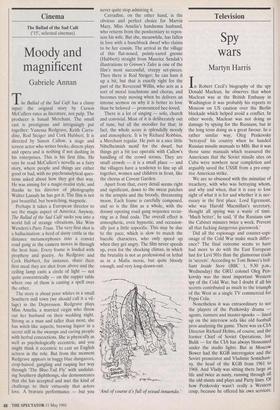Cinema
Moody and magnificent
Gabriele Annan
The Ballad of the Sad Café has a classy input: the original story by Carson McCullers rates as literature, not pulp. The producer is Ismail Merchant. The small cast is prestigious and intriguingly put together: Vanessa Redgrave, Keith Carra- dine, Rod Steiger and Cork Hubbert. It is directed by Simon Callow, a stage and screen actor who writes books, directs plays and opera and is nothing if not dashing in his enterprises. This is his first film. He says he read McCullers's novella as a fairy story, where people and things are either good or bad, with no psychoanalytical ques- tions asked about how they got that way. He was aiming for a magic-realist style, and thanks to his director of photography Walter Lassaly he has got it. The film is not just beautiful, but bewitching, magnetic.
Perhaps it takes a European director to see the magic aspect of America. Anyway, The Ballad of the Sad Café sucks you into a world full of strange vibrations, like Wim Wenders's Paris Texas. The very first shot is a hallucination: a herd of dusty cattle in the distance metamorphoses into a convict road gang as the camera moves in through the heat haze. Every frame is loaded with prophesy and poetry. As Redgrave and Cork Hubbert, for instance, share their first meal they are shot from above and the ceiling lamp casts a circle of light — not quite concentrically — on the supper table where one of them is casting a spell over the other.
The story is about poor whites in a small Southern mill town (we should call it a vil- lage) in the Depression. Redgrave plays Miss Amelia, a married virgin who threw out her husband on their wedding night. Strong as a man and taller than most, she has witch-like aspects, brewing liquor in a secret still in the swamps and curing people with herbal concoctions. She is physically as well as psychologically eccentric, and you might think it eccentric to cast an English actress in the role. But from the moment Redgrave appears in baggy blue dungarees, crop-haired, gangling and rasping her way through `The Blue-Tail Fly' with undulat- ing Southern diphthongs, she demonstrates that she has accepted and met the kind of challenge to their virtuosity that actors love. A bravura performance — but you never quite stop admiring it.
Carradine, on the other hand, is the obvious and perfect choice for Marvin Macy, Miss Amelia's handsome husband, who returns from the penitentiary to repos- sess his wife. But she, meanwhile, has fallen in love with a hunchback dwarf who claims to be her cousin. The arrival in the village of this flat-nosed, pointy-eared gnome (Hubbert) straight from Maurice Sendak's illustrations to Grimm's Tales is one of the film's most successful, creepy set-pieces. Then there is Rod Steiger; he can ham it up a bit, but that is exactly right for the part of the Reverend Willin, who acts as a sort of moral touchstone and chorus, and becomes truly moving when he delivers an intense sermon on why it is better to love than be beloved — pronounced bee-loved.
There is a lot of singing — solo, church and convivial. Most of it is deliberately out of tune, but all the moodier for that; in fact, the whole score is splendidly moody and atmospheric. It is by Richard Robbins, a Merchant regular. He puts in a nice little Nibelheimish motif for the dwarf, but things get a bit too operatic with Callow's handling of the crowd scenes. They are small crowds — it is a small place — and the villagers have a tendency to line up all together, women and children in front, like the chorus at Covent Garden.
Apart from that, every detail seems right and significant, down to the sweat patches in the armpits and the broody, threatening moon. Each frame is carefully composed, and so is the film as a whole, with the doomy opening road gang sequence recur- ring as a final coda. The overall effect is atmospheric, even hypnotic, and occasion- ally just a little soporific. This may be due to the pace, which is slow to match the bucolic characters, who only speed up when they get angry. The film never speeds up, even for the shocking climax, in which the brutality is not as professional or lethal as in a Mafia movie, but quite bloody enough, and very long-drawn-out.
`And of course it's full of sexual innuendo.'


























































 Previous page
Previous page